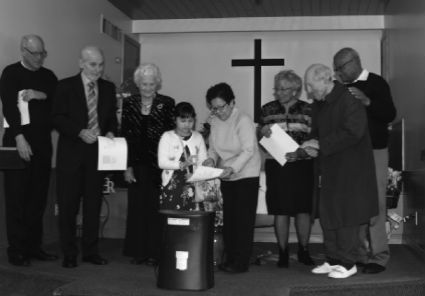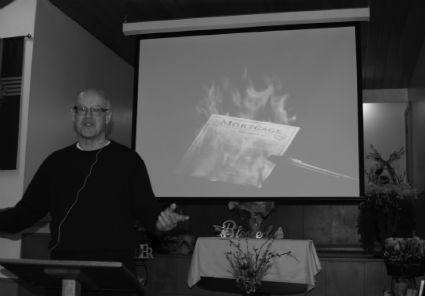Gratitude and Stewardship: The Winning Combination
 Mortgage shredding. Left to Right: Bill Hall, Doug Smith (past Cornerstone Pastor), Shirley
Burrows, Emilia Stankovic (young lady), Mirna Esguerra, DeHavilland Brown, Joseph Sutai, and Trevor Brown. Photo: Steve MacLellan
Mortgage shredding. Left to Right: Bill Hall, Doug Smith (past Cornerstone Pastor), Shirley
Burrows, Emilia Stankovic (young lady), Mirna Esguerra, DeHavilland Brown, Joseph Sutai, and Trevor Brown. Photo: Steve MacLellanAt the end of January I had the opportunity to celebrate a mortgage burning party with Cornerstone Church – our Toronto West congregation. (It was actually a mortgage shredding party as their insurer would take a dim view of having a fire in the sanctuary.)
Many years ago the congregation stepped out in faith and purchased a vacant church building in order to be a local presence of the Kingdom in that part of Toronto. Over the years the people at Cornerstone did fundraising, took up extra contributions, and provided many hundreds of volunteer hours to pay for and maintain this ministry of love in their community.
In addition to the efforts of the group, two individuals stepped forward, one through his estate, and another through a large personal donation, to finally pay off the mortgage. Now those funds that were once earmarked for the mortgage can be used for local ministry.
While these two large donations were pretty overwhelming, they don’t overshadow the multiple donations that arrive in our office here in Saskatoon on a daily basis. One major thing I have learned in my first year as Canadian Director of GCI Canada, therefore, is that our membership is overwhelmingly generous.
I can’t say enough to all of you who have supported this church over the years with your finances and time.
What is Stewardship?
So, what does gratitude have to do with stewardship?
First, let’s look at what stewardship means.
Churches know that the concept of stewardship involves more than money. But so much comes down to that in the end.
And why not?
Jesus referenced the subject constantly – treasure in the field, the widow’s two copper coins, “render to Caesar what is Caesar’s.” He spoke about missing silver pieces, the hunt for precious pearls, vineyards, servants and masters, generous fathers and cruel debtors, day labourers looking for work – a gamut of economic activity.
Jesus also set the example in giving. He paid the two-drachma temple tax (Matthew 17:24 and verse 25). He counselled “when (not if) you give to the needy” in the Sermon on the Mount (Matthew 6:2-4).
Henry Smith, one of the silver-tongued preachers of Elizabethan England, expounded the lesson of Romans 12:1-2 in timeless terms: “That is, as Christ gave himself for you, so you must now give yourselves to him. As he was sacrificed for you, so you must be sacrificed for him. Not your sheep, not your oxen, nor your goats, but yourselves. You must be the sacrifice – living, holy, and acceptable” (A Golden Treasury of Puritan Devotion, page 78).
This is “Whole Life” stewardship. It has been defined as the wise management of resources, or in Christian terms, organizing our lives for God’s purposes.
 Canadian Director, Bill Hall, speaking at Cornerstone Christian Fellowship's (Toronto, ON) "mortgage burning" celebration. Photo: Steve MacLellan
Canadian Director, Bill Hall, speaking at Cornerstone Christian Fellowship's (Toronto, ON) "mortgage burning" celebration. Photo: Steve MacLellan The power of Stewardship
Secondly, stewardship carries enormous power.
Many will remember the global economic crisis of 2008. People we entrusted with the proper management of our resources proved themselves utterly selfish, unreliable and incompetent, and the result was chaos. Where’s Joseph when we need him? Compare his stewardship of Egypt’s resources to the mess we’ve inherited. He saved a major empire from collapse and averted mass starvation. But that’s the power of stewardship. It has the power to save or destroy.
Imagine being Paul, then, when he realized what God had entrusted him with. Just like Joseph, Paul had been given special inside knowledge, that followed up on would have the power to save. For Joseph it was a vision of Egypt’s future for the next 14 years, but for Paul it was something much greater. He’d been “entrusted with the secret things of God” (1 Corinthians 4:1). Suddenly, Paul found himself with the hottest knowledge that had ever existed. It was “God’s secret wisdom” (1 Corinthians 2:7), which God had “destined for our glory before time began.”
Literally Priceless Knowledge
Hidden away in a time capsule before universe began was the secret to our human destiny, and here Paul had it. He knew the one great secret every human being would love to know: What happens to us in the end? And the capsule not only revealed what the end was, it explained exactly how God was getting us to that end, too.
God, in other words, had given Paul the secret to human salvation. And that put Paul in exactly the same position as Joseph. He too had been given the power to save. So, what would Paul do with this amazing secret? Would he pass it on, accurately and faithfully, or would he sprinkle a few of his own thoughts into the mix? Would he prove to be a good steward of the secret things of God, or a bad one? Could Paul be trusted? Fortunately, Paul knew that “stewards are required to show themselves trustworthy” (1 Corinthians 4:2), so when he realized what he’d been entrusted with and where it had come from, he didn’t pull any punches. “This is what we speak, not in words taught us by human wisdom, but in words taught by the Spirit” (2:13).
Imagine saying that in public, that what he was preaching didn’t come from any human source, it didn’t include any gems of human spirituality, like the best of Buddha or the sayings of Krishna, and in fact it had nothing to do with any typical human religious stuff at all, because God’s secret wisdom consisted only of “words taught by the Spirit.” But that must have been tough for Paul to accept too, because what the Spirit taught was vastly different to anything Paul had been taught so far, as well.
It must’ve been terribly tempting for Paul, then, to adjust the message slightly to make it more acceptable to people. But Paul stuck to his guns. “We have not received the spirit of the world, but the Spirit who is from God,” he repeated, “that we may understand what God has freely given us” (2:12).
 Each weekend, GCI members are overwhelmingly generous. Photo: Istock mabe123
Each weekend, GCI members are overwhelmingly generous. Photo: Istock mabe123Freely given us? That wouldn’t go across at all well in Paul’s world, because he and his fellow Jews had always been taught that nothing came for free with God. It always came with strings attached. If you wanted God to bless you, it took hard work. You had to obey his commandments. You had to fast, study, pray, do your sacrifices and ritual washings, and be circumcised as well. No, nothing came for free. There was always a price to pay. And Paul had been willing to pay that price too (Philippians 3:5). As far as doing his part in “legalistic righteousness” he was “faultless”. And now, all of a sudden, he’d been handed the Secrets of human salvation and none of them included anything he and his fellow Jews had always done for God. Instead, the Secrets contained only what God had done for them.
Now what was Paul supposed to do? The religious folks would nail his hide to the wall if he started preaching a message like that, because they weren’t the least bit interested in God giving people anything. They much preferred working for God’s blessings, striving to be righteous, and doing one’s spiritual disciplines.
Well, what Paul did was be a good steward: “By the grace God has given me, I laid the foundation as an expert builder” (1 Corinthians 3:10). He did a grand job of the gospel of amazing grace he’d been entrusted with, and he publicly assigned himself to be cursed if he ever strayed from it too: “But even if we or an angel from heaven should preach a gospel other than the one we preached to you, let them be under God’s curse!” (Galatians 1:8).
Gratitude the foundation for Stewardship
Paul stuck to one message and one message alone: What God has freely given us through his Son, Jesus Christ. That was the secret to human salvation, and Paul never veered from it, despite being beaten up, hated for it, and having to spend his entire life from that point on battling those who taught that some form of human effort was still needed to attain a state of righteousness.
Paul’s stewardship wasn’t based on fear of “missing out,” or working to secure his salvation. Instead, it was based on a different foundation. Gratitude.
That is what drives “Whole Life” Stewardship, an appreciation of the grace we have experienced through Jesus Christ, and inspired by the Holy Spirit.
May the Holy Spirit show you how “Whole Life” Stewardship applies in your daily walk with the Triune God.
By Bill Hall, Jonathan Buck and Neil Earle